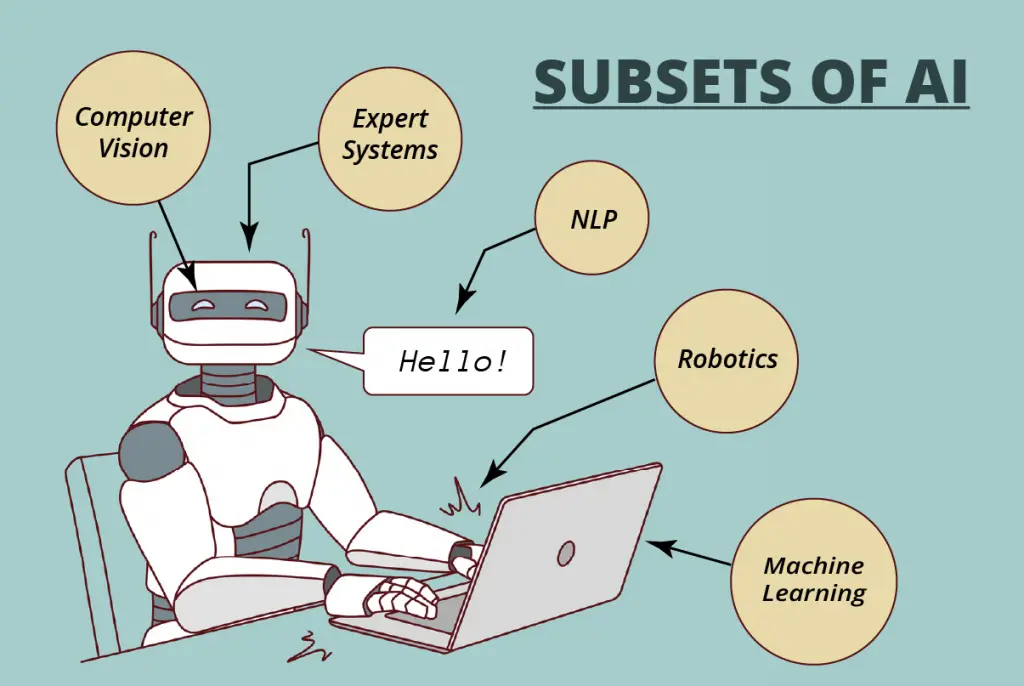Artificial intelligence : The Key to Gaining a Competitive Edge for Top Businesses

Table of Contents
Introduction
When AI (Artificial Intelligence) is mentioned, most people think of it in relation to futuristic worlds, science fiction dystopias and the apocalypse as is depicted on TV. However, in today’s world filled with cascading technological advancements, AI has become a household name – and sometimes even a household presence.
It has woven itself into the fabric of everyday life, but perhaps more importantly, it is becoming an increasingly powerful business asset with ramifications across countless industries. Embracing AI is no longer optional for businesses—it’s essential for staying ahead in an increasingly competitive landscape. This article will delve into how AI influences businesses and why adopting it is vital for future success.
What is Artificial Intelligence (AI)?

AI- Artificial Intelligence is an umbrella term that refers to a software possessing the ability to engage in the human intelligence process. It is the simulation of human intelligence in machines, enabling them to perform tasks that typically require human cognition, such as learning, problem-solving, reasoning, and understanding natural language.
AI systems use algorithms and models to analyze data, recognize patterns, and make decisions. AI is present in various forms, from chatbots and recommendation systems to advanced applications like autonomous vehicles and predictive analytics. It plays a crucial role in automating processes, optimizing business operations, and driving innovation across industries.
Common AI technologies:

AI encompasses a wide range of technologies like machine learning (ML), natural language processing (NLP), and computer vision. These tools are used to analyze data, recognize patterns, and make predictions that guide business decisions. For example, NLP is used in chatbots to understand and respond to customer inquiries, while ML algorithms help companies predict market trends. AI’s versatility makes it applicable to industries as varied as healthcare, retail, and finance.
Benefits of integrating Artificial Intelligence in business
- Enhanced Decision-Making: AI enables businesses to make data-driven decisions by analyzing vast amounts of data. The sub-set of AI that handles this is ML- Machine Learning. ML uses different algorithms and models to analyze very large datasets, recognize patterns in it, draw conclusions from it and apply it to the command given.
- Process Automation: The integration of artificial intelligence in processes makes it possible to free human employees from routine tasks and redirect their efforts towards higher-value work. A good example can be seen when looking at banks such as JPMorgan Chase which surprisingly has introduced an AI program called; COIN- The AI system which reviews commercial loan agreements. This program also achieves in seconds or minutes something that would take about 360,000 man-hours of work per year, therefore saving time and eliminating mistakes.
- Cost Savings: AI-driven automation and optimization lead to significant cost reductions. In the automobile industry, Tesla employs AI – Computer Vision AI to analyze large amounts of visual data in its manufacturing processes. E.g. AI- powered quality control systems can identify defects in real time, optimize production lines, thereby enabling immediate corrections, reducing waste, and enhancing overall efficiency.
- Improved Customer Experience: AI is revolutionizing how businesses interact with customers by providing personalized experiences. For instance, Spotify, Youtube music, etc. uses AI algorithms to curate personalized playlists based on users’ listening habits. This personalized approach keeps users engaged, leading to higher subscription rates.
- Scalability: AI allows businesses to scale up operations quickly and adapt to market changes. E-commerce giant Amazon uses AI-powered demand forecasting to adjust inventory levels, ensuring products are always in stock without overstocking. This scalability has been crucial in meeting customer demands, especially during high-traffic shopping periods like Black Friday.
Challenges Integrating Artificial Intelligence (AI) in Business.
- Cost: Implementing AI solutions can be expensive due to high initial costs for software, infrastructure, and skilled personnel. However, cloud-based AI solutions like those offered by Microsoft Azure and Google Cloud can reduce these costs, making AI more accessible.
- Skill Gaps: There is a shortage of skilled AI professionals, making it challenging for businesses to develop and maintain AI solutions. Investing in employee training and partnering with AI service providers can help mitigate this issue.
- Data Privacy Concerns: AI systems require large amounts of data, raising concerns about user privacy. Businesses need to ensure compliance with regulations like GDPR and CCPA to protect user data.
How Artificial Intelligence is transforming business.
AI isn’t a replacement for human ingenuity, it is a supporting tool meant to make mundane tasks easier to handle. AI’s abilities make the technology a valuable business tool, particularly in the following areas:
- ML
- Cybersecurity
- Customer relationship management (CRM)
- Internet and data research
- Digital personal assistants
For the purpose of this article we will focus on the first 3.
- Machine Learning: It is often used in systems that capture vast amounts of data e.g. clickstreams, system logs, etc. The troves of data are then contextualized and presented to the company’s decision making algorithms to help draw conclusions from such data. N.b ML is transforming underwriting in the insurance industry by streamlining risk assessment and fraud detection.

- Cybersecurity: Network security is adroitly assisted by AI technology which is a potent tool in the prevention and detection of threats. Artificial Intelligence solutions detect the presence of a cyber attack or a threat to information safety by observing the patterns of incoming information. In case of a threat, it can backtrack through your data to find the source & help prevent future threats.

- CRM: Typically, CRM software requires significant human intervention to remain current & accurate. However, today’s best CRM software uses AI to transform into self-updating, auto-correcting systems that do much of the background work of managing customer relationships.

Successful Examples of AI Integration
- Case Study 1: Amazon
Amazon is a leader in using AI across its operations. Its AI-powered recommendation engine, which analyzes user behavior, contributes to 35% of the company’s sales. Additionally, Amazon Web Services (AWS) offers AI services like machine learning models and data analytics tools to help other businesses leverage AI.
- Case Study 2: Lemonade
Lemonade, an insurance startup, uses AI to streamline the claims process. Their AI bot, AI Jim, processes claims instantly, reducing the time from filing a claim to receiving a payout to just a few minutes. This efficiency has helped Lemonade attract tech-savvy customers and build a reputation for quick and hassle-free service.
- Case Study 3: Walmart
Walmart uses AI for various functions, including managing inventory, optimizing supply chains, and improving the customer shopping experience. They use AI-based robots to scan store shelves, ensuring products are stocked and available. Walmart’s AI systems also analyze customer behavior to provide personalized recommendations, increasing online sales.
The Future of Artificial Intelligence in Business
AI is expected to further transform industries, with emerging trends like AI-powered automation, advanced predictive analytics, and enhanced human-AI collaboration. The global AI market is expected to reach over $1.8 trillion by 2030.
Projections estimate that the banking industry could increase by $340 billion as a result of GenAI.
Artificial Intelligence will continue to play a crucial role in sectors such as healthcare, where it can aid in diagnosing diseases and personalizing treatment plans, and in finance, where it helps with risk assessment and fraud detection.
In conclusion, the integration of AI into business processes provides numerous benefits, from improved decision-making to cost savings and enhanced customer experiences. Companies like Amazon, Lemonade, and Walmart showcase how effective AI adoption can drive success. As AI continues to evolve, businesses that invest in AI technology early are likely to maintain a competitive edge, adapting more quickly to industry changes and consumer needs.
References:
- How Artificial Intelligence Is Transforming Business – businessnewsdaily.com
- What is AI? Artificial Intelligence Explained | Definition from TechTarget
- What is Machine Learning? | Oracle Nigeria
- What is Natural Language Processing (NLP)? | Oracle Nigeria.
- What Is Computer Vision? | Microsoft Azure.
- How Amazon Uses AI to Help Customers Shop With Confidence | Technology Magazine.
- The Sixth Sense: Lemonade’s 2019 Product In Review.
- How Walmart is using generative AI | Retail Dive
- The best CRM: Comparing HubSpot and Zoho CRM – Business Hub One
- 80 AI Statistics Shaping Business in 2024 – Vena.







